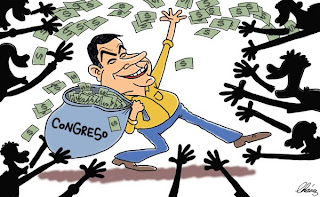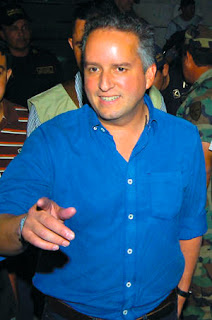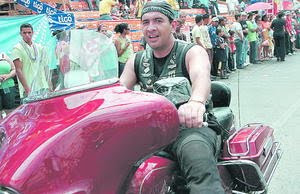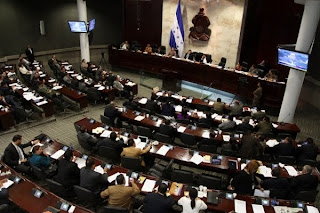
President Pepe Lobo, Esdras Amado López, 'journalist',
and Venezuelan President Hugo Chávez
The following are some tidbits about what has been going on in Honduras lately to catch you up-to-date after my much needed news break. All of the links are to articles in Spanish, unless otherwise noted.
Deja vu all over again
Talk about rejoining Hugo Chávez's ALBA and Petrocaribe has picked up again after Honduras failed to qualify for US Millennium Challenge program funds because of corruption, human rights violations, and other issues — which resulted in an angry response from President Lobo, just as back in 2008 when Zelaya said he wasn't getting enough cash from the US and needed to look elsewhere. Even more worrisome, Chávez is getting a direct foothold in Honduras territory, specifically the Bajo Aguán, noted for militant
campesino groups and Venezuelan narco plane landings
[article in English], a place ripe for Chávez propagandizing.
As
Proceso Digital so delicately put it, "These funds, since they are placed in trust, beyond the strict budgetary control, are coveted by rulers not inclined to fiscal rigor." Evidence of the lack of transparency is the fact that though these funds were received in 2008-2009, the public was just informed for the first time on January 5, 2012, how much money was available from Petrocaribe (originally US $183 million and now zero), when it was spent (the last of it 8 months ago), where it went, and what it was actually spent on (we still don't know).

In a press conference apparently impulsed by rumors of a 'missing' US $150 million, Minister of Finance William Chong Wong and President of the Central Bank Maria Elena Mondragón went to great pains to differentiate between Petrocaribe funds (which have to be paid back) and ALBA funds (which don't), but were only very vague about when and where the ALBA funds were spent, of which
US $49.8 million supposedly remain. The ALBA funds were to be used for such things as providing housing for the poor, so you might wonder why it has been sitting in a bank account since 2008. The first article states that Honduras indebted itself with Venezuela for more than US $263 million, but second states that the current remaining amount is US $200 million. Chong Wong said that La ENEE authorities are responsible for detailing where its US $51 million was spent (since there is some speculation about misuse of funds there, too).
Also interesting is that in May 2011 during one of the many pushes for rejoining Petrocaribe
[Blogicito article in English], the media was led to believe that the 2008 Petrocaribe funds were still in the bank. Yesterday in the
press conference apparently prompted to dispel rumors, the public found out that the funds had actually been spent in 2009, 2010 and
April 2011. Very deceitful of the government.
Pepe says Petrocaribe is a go. He likes the "flexibility" of Petrocaribe and the fact that it doesn't come with any conditions on what they do with the money or anti-corruption measures like the US money does — which
he resents greatly. Putting the country into further long term debt for current consumables is not an issue for him, neither is reducing the over-inflated government payroll budget. Honduran politicians would sell Honduras to the devil himself if it meant more money in their pockets and/or more political currency for their party (more
bonos — cash bonuses
to give out).
Selling the farm to buy the pig

The finances of Honduras are in dire straits. The government is unable to meet the ever-growing, exaggerated government payroll costs, and unwilling to cut expenses in this "government of austerity", which passes out jobs and cash
bonos like money comes from a bottomless barrel.
By one estimation, Lobo is desperate for funds because he has a failed government which has increased the bureaucracy and national budget while giving out Bonos Diez Mil without any idea of how to pay for any of it. In order to shore up the barrel before the Venezuelan funds come rolling in, Honduras will be holding
two large auctions of public property in 2012. I'll bet you a dollar that we will never know who bought what or how much they paid for it!
Striking teachers

Teachers' unions claim that 50% of teachers did not receive their vacation pay in December and they are already
planning strikes in 2012. The Honduran public school year runs February through November and supposedly includes 200 days of classes, though most schools have not reached 200 days of classes yet in this century. Last year, some schools had as little as 80 days of classes due to teacher strikes. Even worse for the future of Honduras, high school graduates can become teachers with no university training at all. More deja vu.
Emergency!
In less than two years of his administration, President Pepe Lobo has declared
17 state of emergencies, on average an emergency every 38 days. Decoded, "state of emergency" often has nothing to do with true emergencies. It means that the government can make direct purchases and grant abusive contracts to friends, family members, convicted felons, and others without those pesky requirements to have an open bidding and qualification process as required under the Law of State Contraction. One of those recent emergencies resulted in a 16-year 100 megawatt multimillion dollar contract for electrical energy with a company (Westport Finance) who has no experience in the area of energy and had revenues in 2010 of about US $96,000 and two employees.

A 16-year emergency? Only in Honduras. "It stinks of corruption," said one congressman. Honduras government officials had the nerve to lead people to believe the contract was with the well-known Finland company Wartsilla, when in fact it was not. The contract itself was not even provided to congressmen until the night of the vote. So much for transparency.
Mañana

The total of these emergency contracts in the past two years is said to be L.5.8 billion. Repeated complaints of fraud and corruption from citizens, congressmen, and other organizations have had no effect. Now the
Anti-Corruption Prosecutor Henry Salgado (who I'm not sure has ever won a case) announced that they will be investigating whether there are any penal responsibilities related to these emergency contracts.
He also promises action in the ENP (port authority) corruption and the L. 80 billion fraud and corruption in INPREMA (teachers' retirement fund) cases
within the next three weeks. Check out the reader comments on this article — no, don't bother. I'll save you the time and translate for you, too: "
jajaja" (hahaha). A separate article reports that the Anti-Corruption unit has a
backlog of 4,000 cases and between 10-15 attorneys to handle them! Pure show and more deja vu.
Unemployment
The unemployment rate in Honduras is somewhere around 30-40% according to various reports. However,
coffee plantations, which need around a million seasonal workers, are required to fill about 100,000 of the jobs with Nicaraguans, Guatemalans, and Salvadorans because, they say, Hondurans do not want the work. Sadly, they also say that
foreigners are better workers. Though this type of worker is paid by the piece (sack of coffee beans), they say that an average worker makes more than minimum wage (about L.250 per day vs. L. 183 per day) and a good worker makes almost twice that. So they say anyway.
Some readers have different opinions.
Minimum wage

Negotiations between business and labor have not resulted in an agreement on the new minimum wage and it is likely that President Lobo will end up setting the 2012 minimum wage as required by law. Hopefully he won't wait until November like he did in 2010. This is a really
complicated issue. While we always focus on the poverty in Honduras, the Honduran minimum wage is higher than all of the competing countries. Nicaragua and Guatemala in particular will be watching this issue and waiting for more businesses to pack up and move to their countries. (Click cartoon to enlarge.)
Taking security into the neighborhoods' hands

In a program called
Barrios Seguros (secure neighborhoods), the municipality of Tegucigalpa has been allowing neighborhoods to close various street entrances, leaving one or more secured or controlled entrance in an effort to slow crime. San Pedro Sula has been allowing something similar. A group of anti-corruption attorneys has filed a complaint with the Supreme Court saying this conflicts with the free circulation right provided by the constitution and laws which proclaim streets to be public property.
The
Mayor of Tegucigalpa and presidential candidate, Ricardo Álvarez, says the measure is to protect lives in this wave of violent crime and that is what should be considered first. Well, why not? Honduran laws are made to be broken, though lately it appears that Honduran laws are made to protect the guilty, never the innocent.
Purification
The new commission,
Dirección Nacional de Investigación y Evaluación de la Carrera Policial (DIECP), which was supposed to be the answer to our prayers about purifying the police department has done nothing except emit statements about how it isn't their job, they don't have the budget, and the law doesn't permit them to intervene anyway. It seems that in congress' rush to pass this law and appoint the commissioners in a big show to appease the public, they failed to note that the purpose of the new commission conflicts with the current internal police law as well as the constitution.
In a
Diario Tiempo editorial, they wrote that those with experience knew since the beginning that the new commission would not function and that there has been no evidence of political will to intervene, purify, or restructure the justice system (police, military, judicial, and prosecutors), much less real capacity to do so. "The gangrene in the police organization, for example, starts at the base, in the police academy, and from there on up, no doubt induced at the top."
However, Pompeyo Bonilla, Minister of Security, announced this week (with no details) the upcoming separation of some unspecified number of police from the basic level to the highest levels in "important positions". Yesterday it was announced that
50 police agents and 25 officials would be fired by next week and some additional number would be rotated. That number was increased to "up to 100" today and then later an announcement was made that
52 police had been separated, including one commissioner general, two commissioners, and one sub-commissioner, and that another separation would occur soon.
Names were not given by police spokesman Ivan Mejía, who said that the law prohibits it and that the affected police could sue the state for damages, even though names have been given in the past. (I'll be watching for a leak.) These police were separated for grave faults (misconduct?), but the Minister of Security is taking no legal action against them as that is the duty of other organizations to investigate and make charges. Mejía refused to give more information despite prodding from the media. He did report that some of the fired personnel had
25-30 years with the police department.
In another blow (no pun intended),
28 new police cadets (5% of the total) were fired after their drug tests came back positive. Apparently the government is taking the position that new hires can be tested for drugs but current employees can not be forced to be tested. That isn't the way I read the law but I'm not an attorney. If that is what the law actually says, then of course it should be changed so that the public is protected, not drug-consuming police officers.
Honduras' Iron Lady
 Julieta Castellanos
Julieta Castellanos, Rector of UNAH and mother of one of the university students murdered by police in October
[article in English], proclaimed the actions as a "fictitious purification" done to calm the public and evade real purification. Castellanos says that we need information about whether these are real firings, suspensions, or rotations, and whether these people are still receiving salary. In a strong statement in which she used words like deplorable, grotesque, and abominable, she said that the organization has had three months to destroy the evidence of police corruption, and she lamented the fact that honest police have not come forward out of fear or intimidation.
Asked by
La Tribuna whether she fears being assassinated because of her constant
denuncias against the police, she stated that she isn't looking for that, but that she does what she has to do. "If something happens to me it is the fault of the police, primarily señor Ramírez del Cid [National Director of Police], because there is no one more interested in something happening to me.... and no one more knowledgeable about corruption in the police since he was the former head of Intelligence."
She also pointed out that it should be easy to prove corruption of police agents and officials who live well beyond what their police salaries could provide, like with three US $25-30,000 cars and houses in wealthy areas. She also reported that as late as a few days ago, police were out in police vehicles in Tegucigalpa extorting businesses. One of those businessmen was expected to pay L. 350,000 because he was an undocumented foreigner, but when they took him to the police post to pay, he only had L.38,000.
New justice system
President Lobo announced Thursday that he will be sending a new packet of security measures to the congress soon to "make changes in the
structure of the Judicial Power". I hope he reads the constitution first.
Washington Post is soooo mean
A
Washington Post article, which was only the latest of many articles in the international media about Honduras' severe crime and criminal police problems, resulted in an uproar from some in Honduras about how unfair it was to write about the situation and possibly scare off tourists and volunteers.
Marco Cáceres of Honduras Weekly
[article in English] called the complaints a cop-out.
"The negative publicity for Honduras worries me too, but honestly... not nearly as much as attempts by people within the Honduran government and business community to downplay the strife. The simple fact of the matter is: It is what it is; the numbers do not lie (at least not too much)."
False pride is a big factor in Honduras' failure to take action against corruption and impunity. As long as those in power are more worried about covering up the embarrassment to the country than taking action to do the right thing, nothing will change.
Stupid Capitalinos
In yet another vague and demeaning comment intended to divide the population, not reconcile it as he incessantly claims, yesterday in Comayagua, President Lobo said how good it was to be there talking about production because in Tegucigalpa (the capital),
they only talk stupidities. Maybe he has a point, but by not naming names, he just insulted some 1.5 million plus Hondurans.
Phew! And that was primarily from the last 2-3 days of news. Can you see why I needed a break from the news? If you don't read or watch the Honduran news, I hope that you found this helpful.

























 Welcome to my Blogicito —
Welcome to my Blogicito — 








